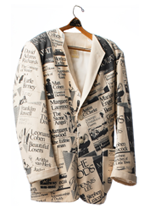Saturday Night: Canada’s Oldest General Interest Magazine
Suzanne Bowness, University of Ottawa
Saturday Night first appeared in Toronto on 3 December 1887 as a 15 x 20-inch weekly paper that sold for five cents, and had a healthy initial circulation of about 10,000. Editor Edmund E. Sheppard announced the broadsheet as a “paper of today” that would be devoted largely to literature and current topics, avoiding controversy except to “have its remarks to make about politics and politicians, and in a breezy yet thoughtful way” would “point out the follies and foibles of those who assume so much and do so little.” (“Salutatory!” Saturday Night, 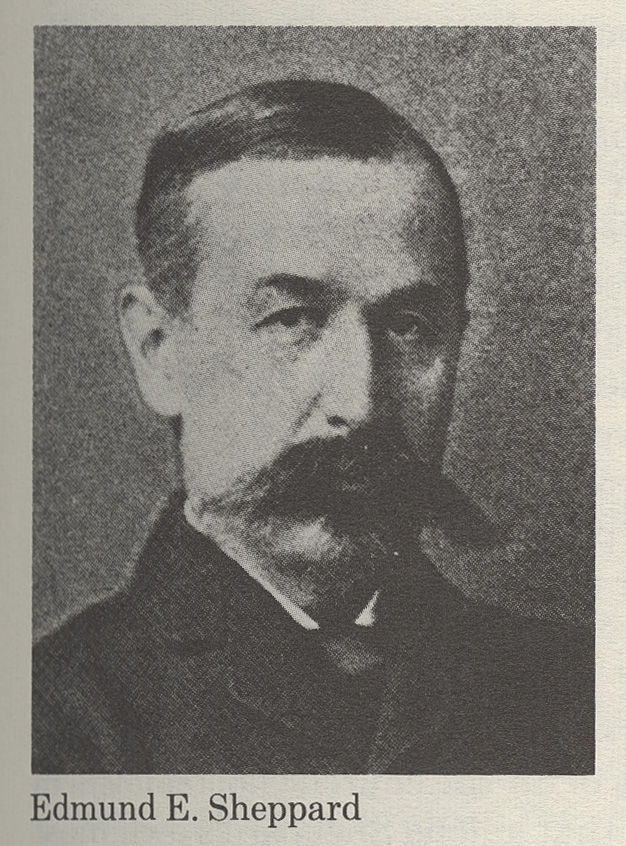 3 December 1887, 1). Yet the weekly’s fabled origins were far racier than this mild introduction suggests, and the following anecdote provides a sense of both its editor’s tenacity and his dedication to journalism. In 1885, Sheppard was editor and publisher of the Toronto News, and was sued for libel by the entire 65th Regiment of Montreal over a story that made allegations against the officers regarding their alleged sympathy for the rebel leader Louis Riel. For months, Sheppard dodged warrants issued to bring him to trial, and by 1887 the litigation had gone on for so long that the courts, although finding him guilty, decided to be lenient by fining him a nominal five hundred dollars. Yet the moderate sentence carried a harsh condition—it forbade Sheppard from editing another daily newspaper in Canada. As a result, Sheppard sold the News and started the weekly
3 December 1887, 1). Yet the weekly’s fabled origins were far racier than this mild introduction suggests, and the following anecdote provides a sense of both its editor’s tenacity and his dedication to journalism. In 1885, Sheppard was editor and publisher of the Toronto News, and was sued for libel by the entire 65th Regiment of Montreal over a story that made allegations against the officers regarding their alleged sympathy for the rebel leader Louis Riel. For months, Sheppard dodged warrants issued to bring him to trial, and by 1887 the litigation had gone on for so long that the courts, although finding him guilty, decided to be lenient by fining him a nominal five hundred dollars. Yet the moderate sentence carried a harsh condition—it forbade Sheppard from editing another daily newspaper in Canada. As a result, Sheppard sold the News and started the weekly 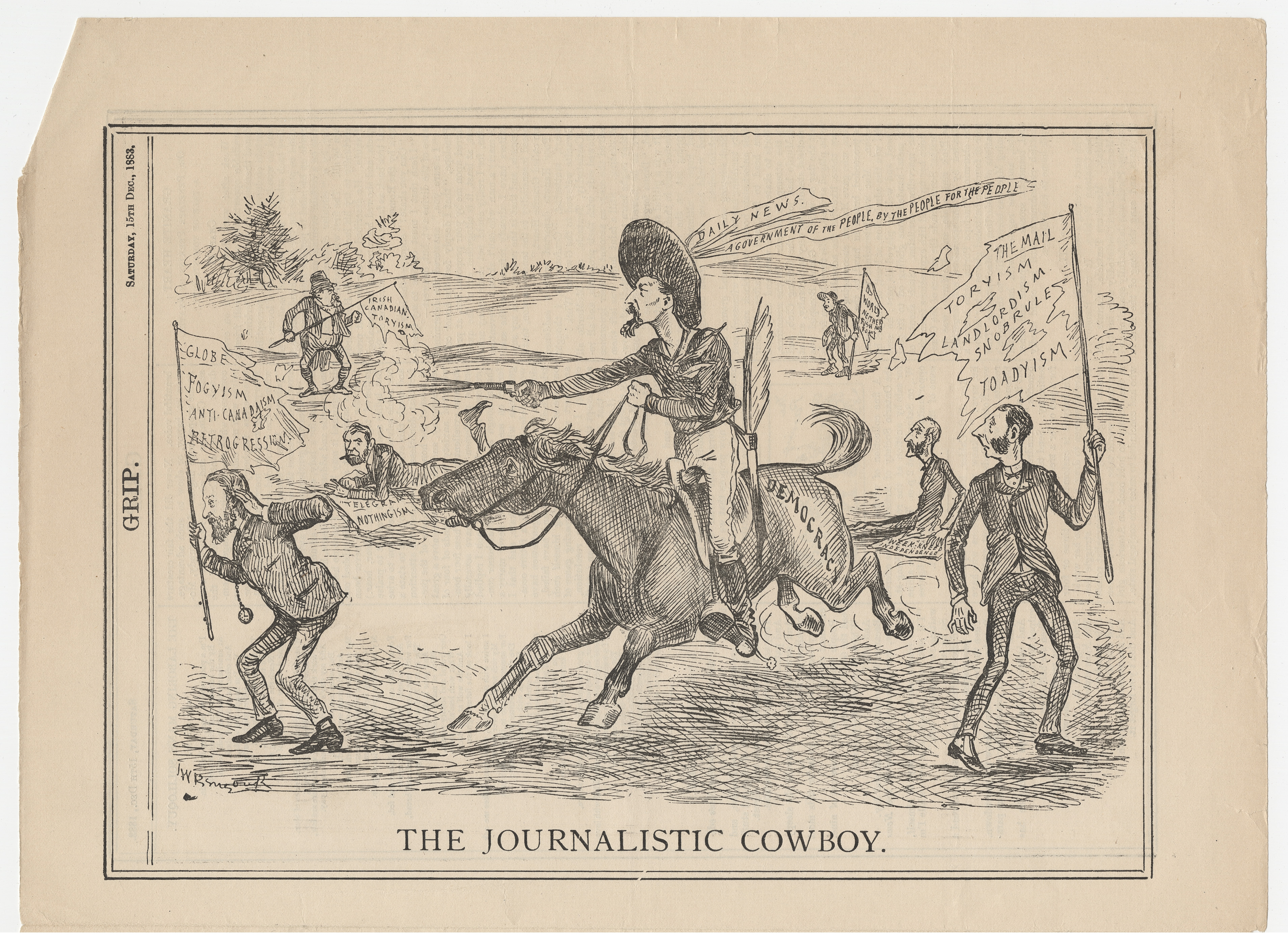 Saturday Night. Following such remarkable beginnings, Saturday Night proceeded to accomplish another significant feat: to endure where other nineteenth-century magazines had not, and to set the tone for high quality literary contributions with its initial printing of work by such writers as E. Pauline Johnson (one of the magazine’s most prolific early contributors, with fifty-two poems in Sheppard’s era alone), Archibald Lampman, Charles G.D. Roberts, Stephen Leacock, John McCrae, and Robertson Davies (who also became Saturday Night’s literary editor in the 1940s).
Saturday Night. Following such remarkable beginnings, Saturday Night proceeded to accomplish another significant feat: to endure where other nineteenth-century magazines had not, and to set the tone for high quality literary contributions with its initial printing of work by such writers as E. Pauline Johnson (one of the magazine’s most prolific early contributors, with fifty-two poems in Sheppard’s era alone), Archibald Lampman, Charles G.D. Roberts, Stephen Leacock, John McCrae, and Robertson Davies (who also became Saturday Night’s literary editor in the 1940s).
In spite of its name, the early Saturday Night was likely intended to provide light Sunday reading, and content included Sheppard’s lengthy “Around Town” social column and an “Out of Town” column featuring dispatches from cities like London, Hamilton, and Montreal. The rest of the paper was filled with articles, profiles, columns about arts and cultural subjects, short stories, poetry, and domestic columns. As the years passed, small text ads expanded to larger, more elaborate display ads, often with illustrations and catalogue information. After twenty years as editor, Sheppard was succeeded by Joseph T. Clark, Frederick Paul, and Hector Charlesworth, who can be 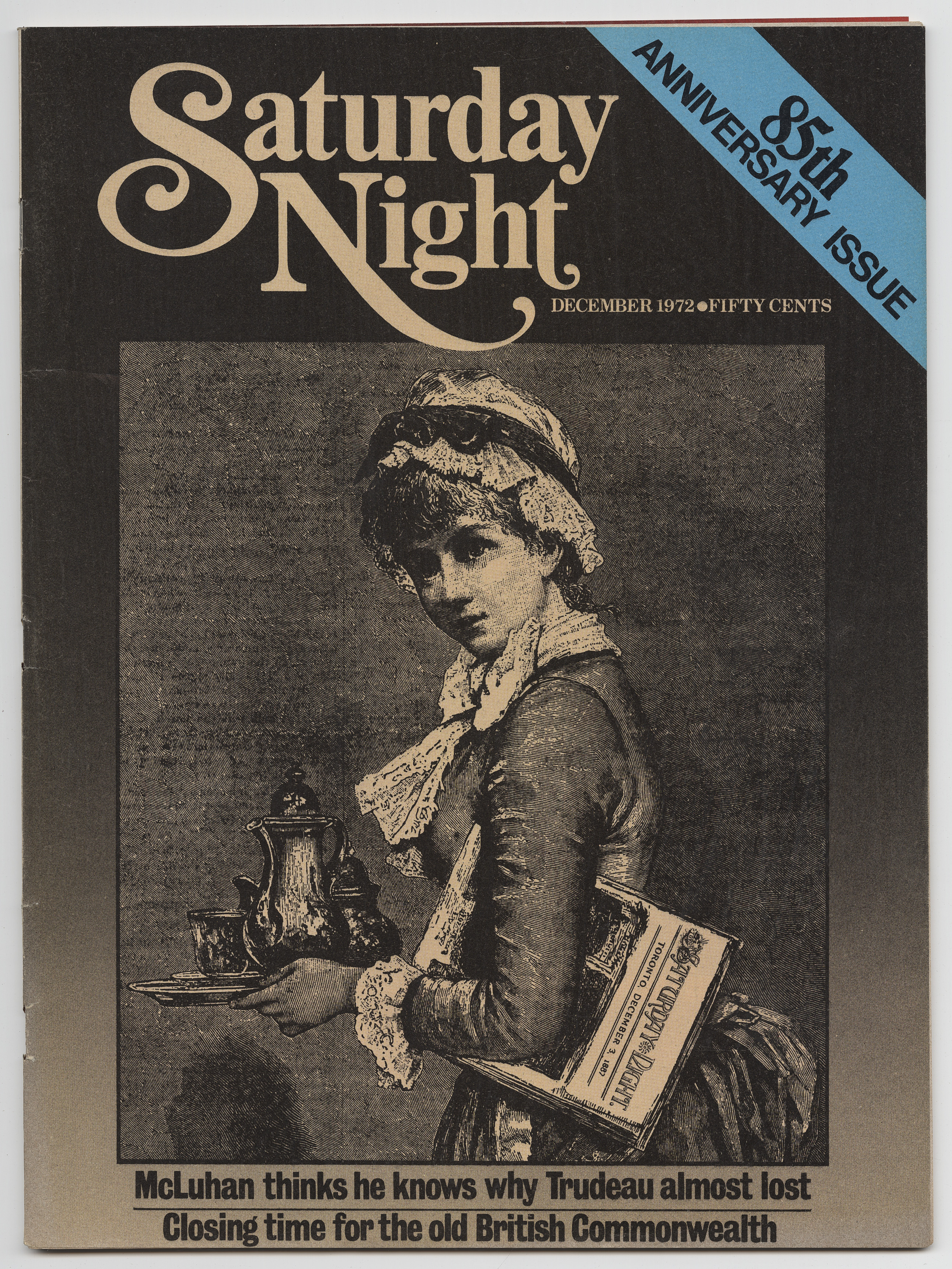 credited with providing many of the anecdotes of early journalism in Canada through his Candid Chronicles memoirs. Charlesworth passed the editorship to B.K. Sandwell, who was the first to equal Sheppard’s longevity at the helm.
credited with providing many of the anecdotes of early journalism in Canada through his Candid Chronicles memoirs. Charlesworth passed the editorship to B.K. Sandwell, who was the first to equal Sheppard’s longevity at the helm.
As the twentieth century progressed, Saturday Night continued to evolve. Under Clark it expanded to thirty-six pages and three sections, including a women’s section, a financial section, and a section on politics and arts. In the 1950s the magazine reduced its format size to that of a news magazine such as Time, and became a bi-weekly publication, a frequency that would later be monthly but would accelerate to weekly again in 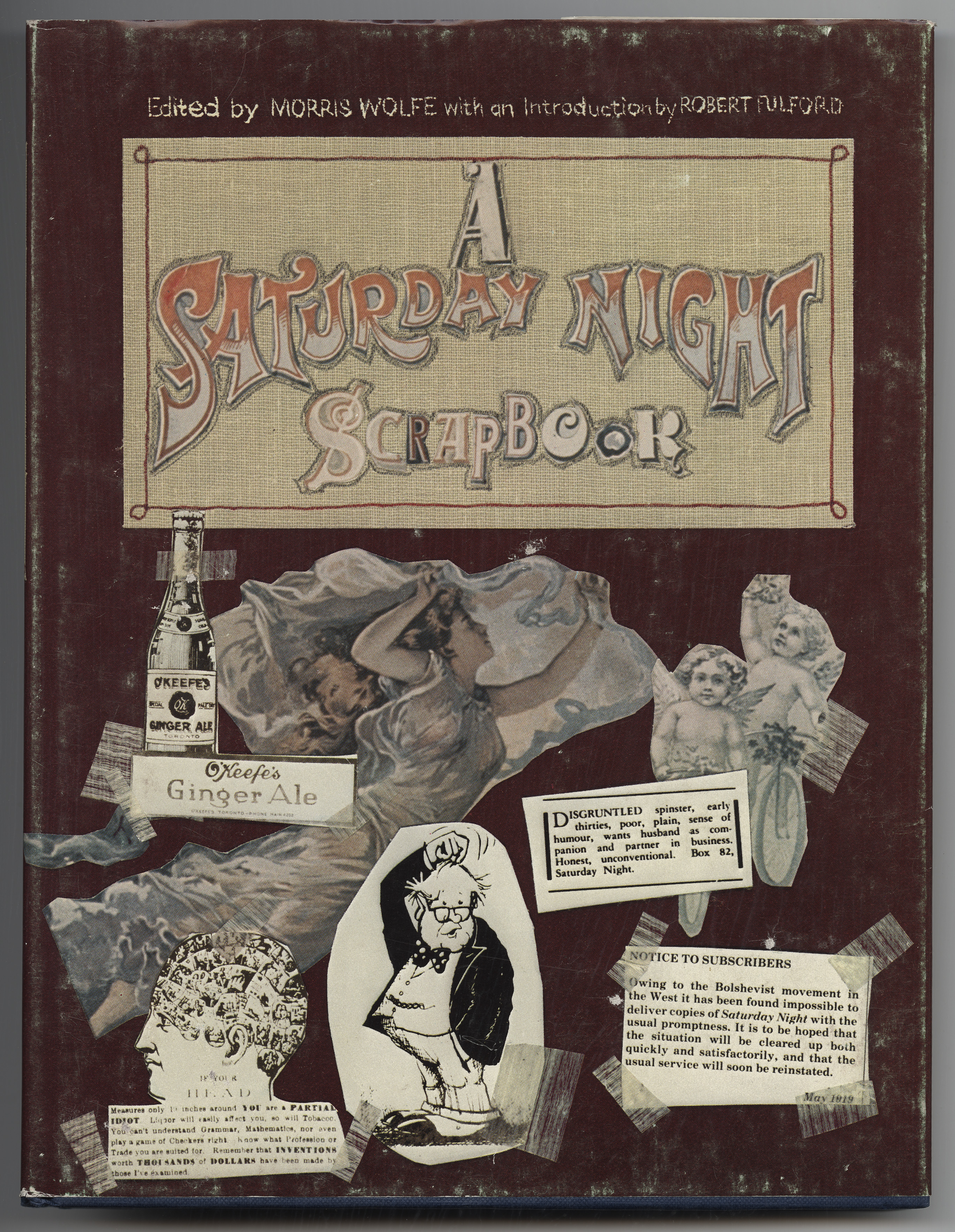 2000. In its final incarnation it was issued monthly until publication was suspended in 2005. In its content, the magazine went through newsy phases as well as more feature-oriented periods, sustained various columns, and continued to publish literary contributions, including essays, short fiction, and poetry. Further documentation regarding the transition of the magazine’s contents is documented in such sources as A Saturday Night Scrapbook, a collection of clippings edited by Morris Wolfe and introduced by long-time editor Robert Fulford, as well as informative sections in Fraser Sutherland’s guide to Canadian magazines, The Monthly Epic.
2000. In its final incarnation it was issued monthly until publication was suspended in 2005. In its content, the magazine went through newsy phases as well as more feature-oriented periods, sustained various columns, and continued to publish literary contributions, including essays, short fiction, and poetry. Further documentation regarding the transition of the magazine’s contents is documented in such sources as A Saturday Night Scrapbook, a collection of clippings edited by Morris Wolfe and introduced by long-time editor Robert Fulford, as well as informative sections in Fraser Sutherland’s guide to Canadian magazines, The Monthly Epic.
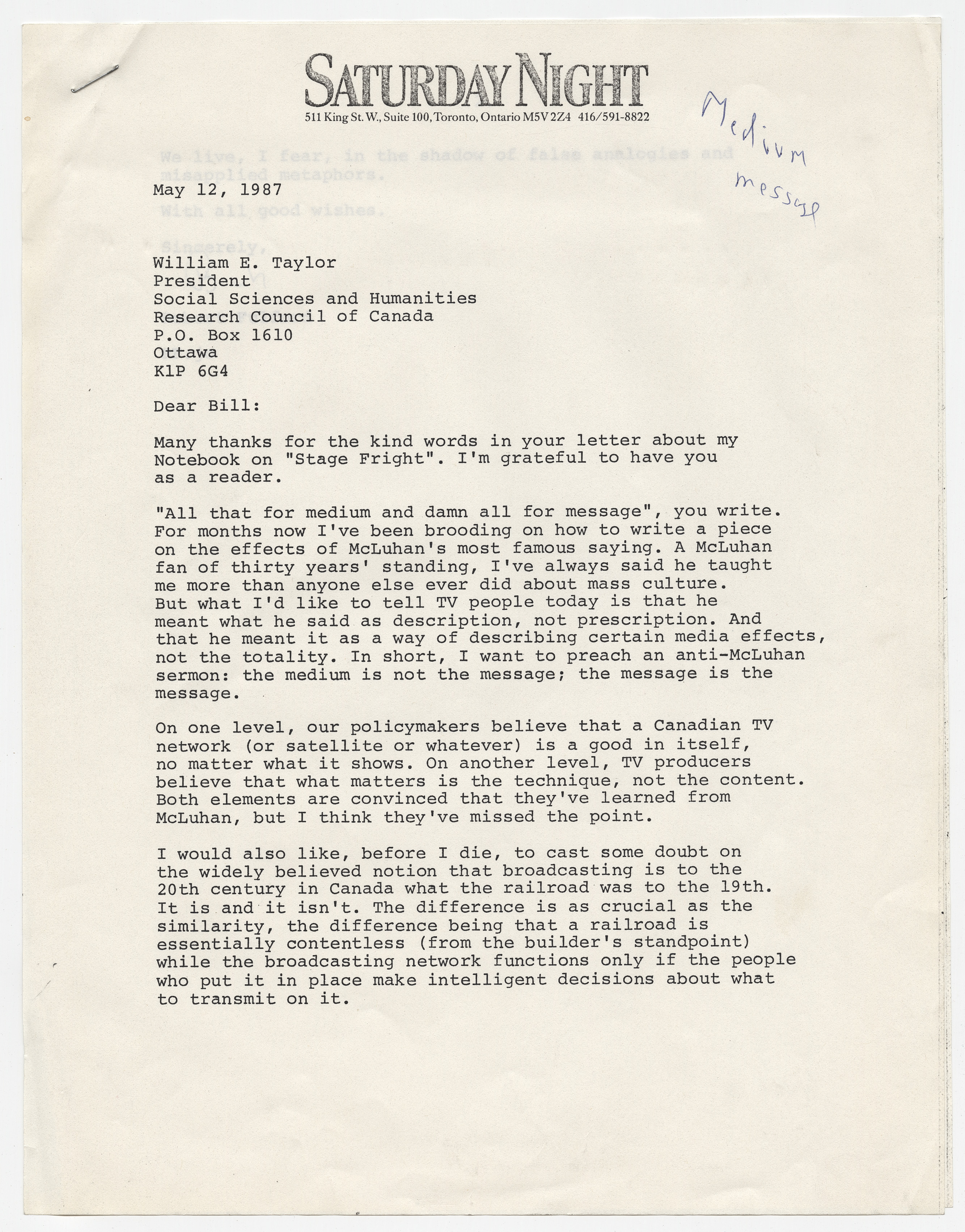 There is little extant archival documentation of the magazine during Sheppard's tenure, although later periods are well-documented in three separate fonds at McMaster University Library: the Saturday Night fonds includes a wealth of material for the late 1960s to early 1980s, and from 1996-2006; additionally, the editorships of Arnold Edinborough (editor 1958-62; president and publisher, 1963-70) and Robert Fulford (1968-87) are chronicled in their respective fonds. The Morris Wolfe fonds, also at McMaster, includes manuscripts and graphic materials for A Saturday Night Scrapbook.
There is little extant archival documentation of the magazine during Sheppard's tenure, although later periods are well-documented in three separate fonds at McMaster University Library: the Saturday Night fonds includes a wealth of material for the late 1960s to early 1980s, and from 1996-2006; additionally, the editorships of Arnold Edinborough (editor 1958-62; president and publisher, 1963-70) and Robert Fulford (1968-87) are chronicled in their respective fonds. The Morris Wolfe fonds, also at McMaster, includes manuscripts and graphic materials for A Saturday Night Scrapbook.
Sutherland, Fraser. The Monthly Epic: A History of Canadian Magazines, 1789-1989. Markham: Fitzhenry and Whiteside, 1989.
Wolfe, Morris, ed. A Saturday Night Scrapbook. Toronto: New Press, 1973.
Morris Wolfe fonds, McMaster University
Saturday Night fonds, McMaster University
Robert Fulford fonds, McMaster University
Arnold Edinborough fonds, McMaster University
